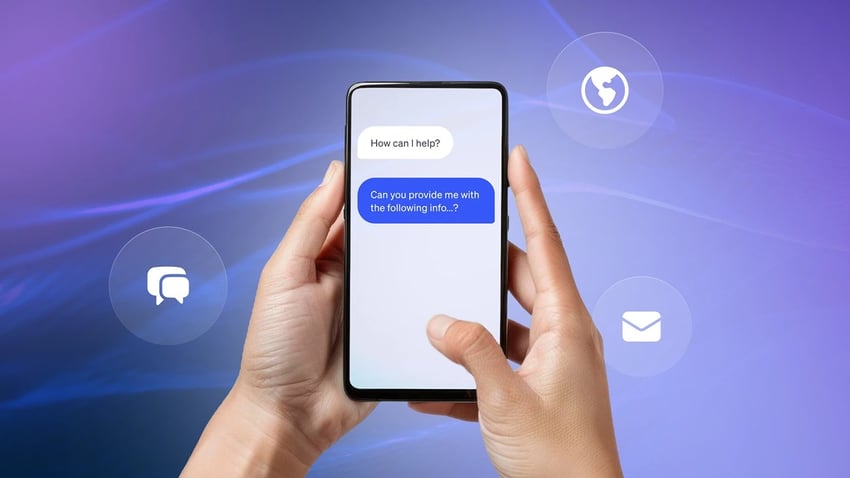Businesses are constantly seeking innovative ways to deliver exceptional customer experiences. This is where an AI-based call center comes in.
AI (artificial intelligence) has the power to enhance customer connections, streamline support processes, and provide valuable insights from customer data. In this post, we’ll explore the benefits of integrating AI into your contact center, everyday use cases for AI-based call centers, and future trends to help you stay ahead of the curve.
Where Do You Rank on the AI Maturity Curve?
Take the 5-minute assessment and get a personalized score and recommended next steps.
What is an AI-based call center?
An AI-based call center is a customer service operation that uses artificial intelligence to automate tasks, assist agents, and expedite support. It replaces slow, manual processes with fast, intelligent systems that can answer questions, route calls, update records, and summarize conversations in real-time.
AI tools work behind the scenes and in real time, like flagging customer issues, suggesting next steps, predicting future needs, and guiding agents mid-call. Virtual agents handle common problems. Intelligent routing gets customers to the right place without the usual bounce-around.
The result? Fewer delays, fewer errors, and more time for agents to handle complex problems. Customers get quicker, more personal help. Support teams move faster, stay sharper, and work smarter.

Benefits of AI Call Center Solutions
AI-based call centers offer solutions that have plenty of benefits that transform the way businesses handle customer interactions and optimize contact center operations. Here are some advantages you’ll get by deploying AI into your contact center.
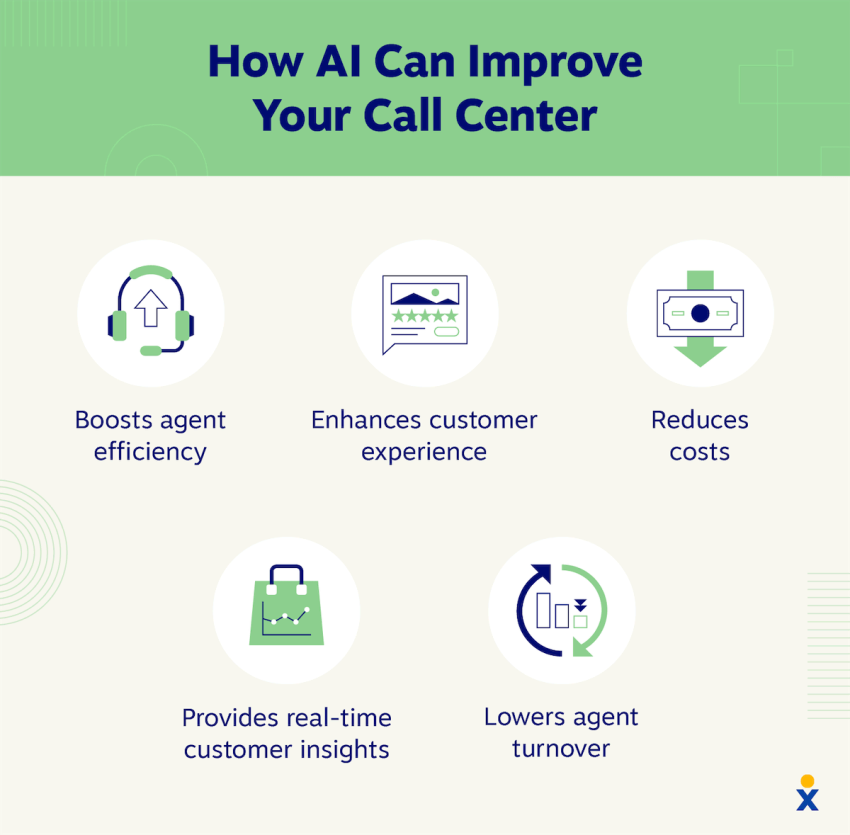
Improves agent efficiency
With the help of AI, you can automate routine tasks to streamline operations. For instance, during high call volume periods, AI can efficiently manage simple customer queries, allowing agents to dedicate their attention to addressing more complex inquiries.
In fact, chatbots can handle up to 80% of routine questions, significantly reducing agent workload. This efficiency boost helps agents handle more customer calls effectively, leading to higher productivity and shorter wait times for customers.
Enhances customer experience
By combining the power of live human agents and artificial intelligence, you can greatly enhance your customer experience (CX).
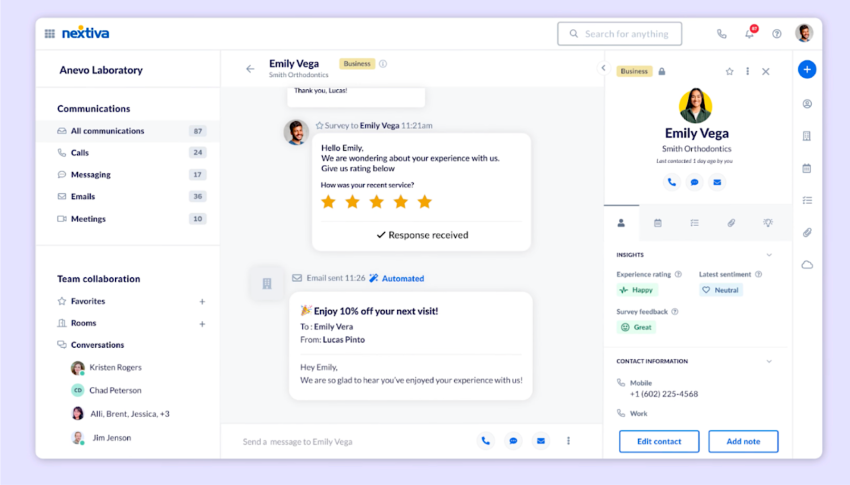
For example, AI enables hyper-personalized interactions, a feature sought by 76% of customers in their call center experiences.
AI algorithms can analyze vast sets of customer data, including past interactions, purchase history, preferences, and demographics. By processing this information, AI can generate detailed customer profiles that agents can use to tailor interactions based on customers’ needs and preferences.
Reduces costs
With automated tasks and optimized resource management, AI offers opportunities to reduce costs. For example, intelligent virtual agents can efficiently handle tasks that would otherwise require human intervention, leading to potential labor cost savings of up to 30%. Organizations can decrease operational expenses by streamlining processes and minimizing human involvement without compromising service quality.

Provides real-time customer insights
AI call center solutions offer actionable customer insights through real-time data analysis, enabling organizations to identify trends and areas for improvement. For example, sentiment analysis tools can detect customer dissatisfaction during calls, prompting agents to intervene and resolve issues proactively. By using these metrics and insights, businesses can continuously optimize operations, improve service quality, and effectively adapt to evolving customer preferences.
Lowers agent turnover
With AI handling repetitive tasks, agents can focus on more complex and meaningful interactions, reducing burnout and churn rates. This shift results in significant cost savings for organizations, with each agent turnover costing around $20,000 annually in replacement costs alone.
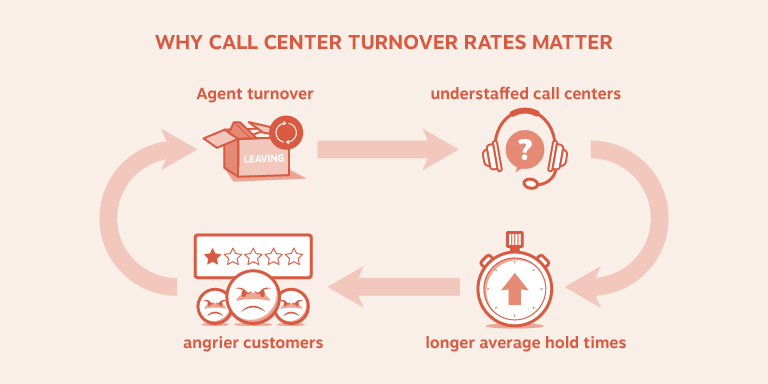
Organizations can improve employee satisfaction and retention by empowering agents with AI-powered tools, which maximizes operational efficiency.
Evaluating contact centers? Get the buyer’s guide.
This guide reveals the five pillars of a modern platform, key questions to ask, and red flags to avoid.
Top 5 Use Cases for Call Center AI
From streamlining interactions to minimizing mistakes, there are plenty of use cases for call center AI. Check out how you can use artificial intelligence in your contact center.
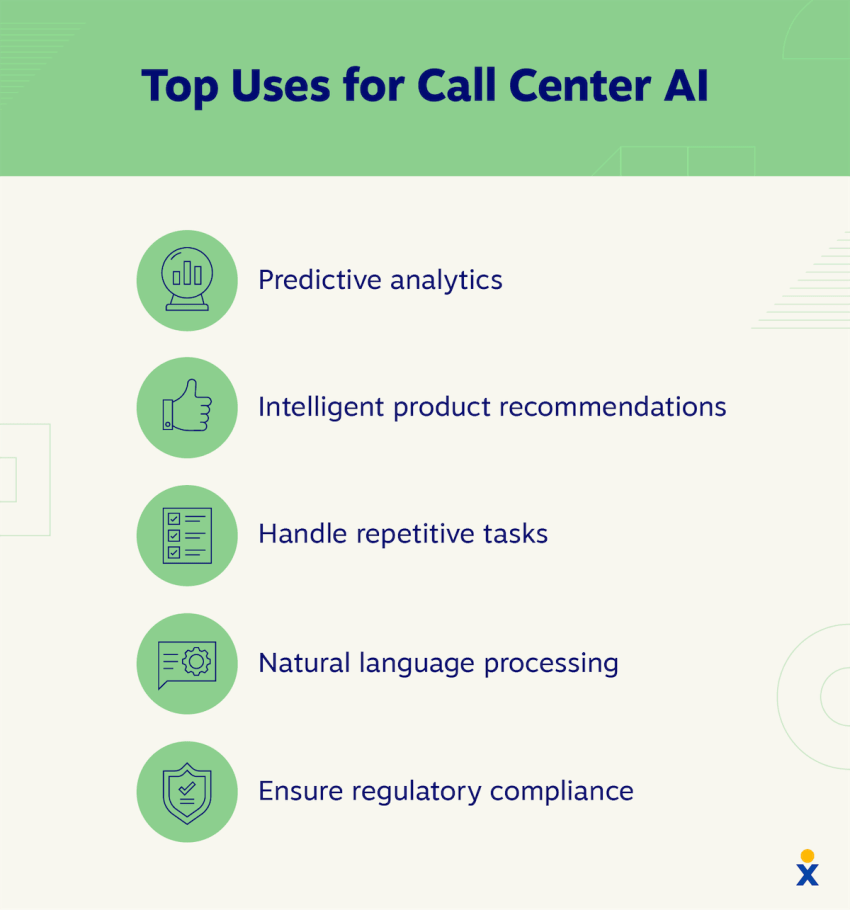
Predictive analytics
AI-based call centers can use the power of predictive analytics to personalize the customer experience. Call center predictive analytics analyzes various data points about a caller. These analytics can include:
- Past interactions
- Purchase history
- Demographics
For example, if a customer contacts a telecom company’s call center about their internet service, predictive analytics analyzes their history to gauge their technical expertise and past issues. Based on this, the AI system uses machine learning to predict the likely reason for the inquiry and suggests custom solutions to the agent.
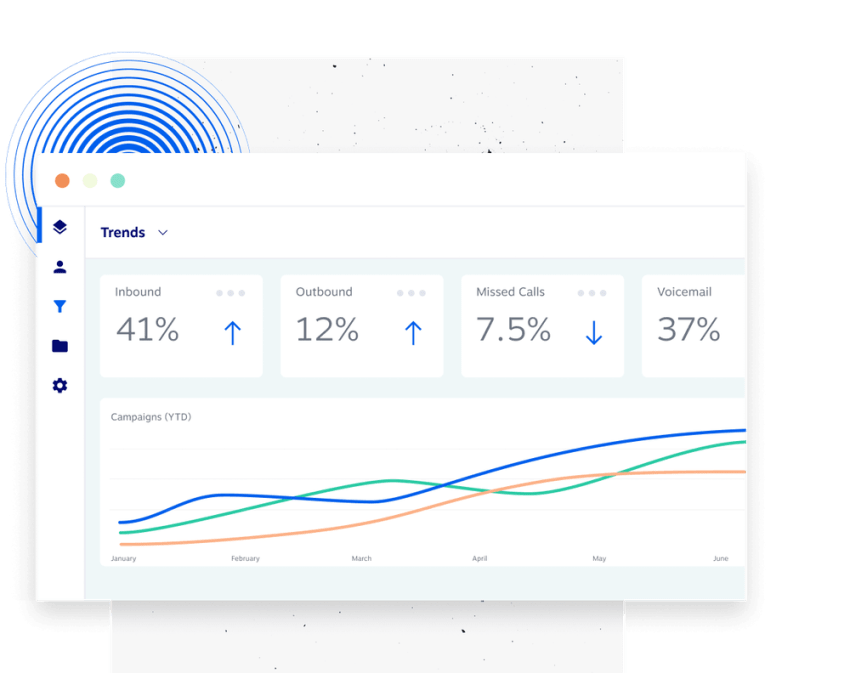
Intelligent product recommendations
AI algorithms can also provide intelligent product recommendations during customer interactions. AI can suggest relevant upsells or cross-sells to customers by analyzing customer data and purchase history.
For instance, when a customer orders an appliance, AI can recognize the context and suggest compatible accessories or warranty extensions. This ensures your customer is getting the most out of their purchase.
Virtual agents and chatbots call deflection
Businesses increasingly use virtual agents and chatbots to deflect routine inquiries away from human agents to reduce wait times and improve overall efficiency. These AI-driven systems can handle repetitive tasks, like answering frequently asked questions or processing simple transactions. These can help free your human agents to focus on more complex issues.
Organizations can streamline their operations by automating customer service and delivering faster, more responsive customer service.
Natural language processing (NLP) for smarter communication
Natural language processing helps call center AI grasp and reply to customer queries in everyday language, which can streamline communication. AI systems have the capacity to do the following:
- Chat naturally with your customers.
- Pick out important details in a conversation.
- Give fitting replies, whether spoken or written.
This knack for understanding and responding suits interactions better, easing customer frustration and boosting satisfaction and loyalty levels.
Industry or regulatory compliance
Call center AI plays an important role in ensuring industry or regulatory compliance by monitoring customer conversations in real time. AI can ensure that mandatory disclosures are communicated to callers effectively by analyzing dialogue and detecting specific keywords or phrases.
For example, in financial call centers, AI can verify that an agent made a disclosure to a customer before pulling their credit report. This ensures adherence to regulatory requirements and mitigating compliance risks.
| Call Center in Action 💡Our collection of case studies shows how thousands of companies grow and succeed using Nextiva’s AI-powered contact center solutions. |
Future Trends and Predictions for AI-Based Call Centers
Call centers evolve with AI technology and changing expectations, shaping customer service. Here are key trends to note.
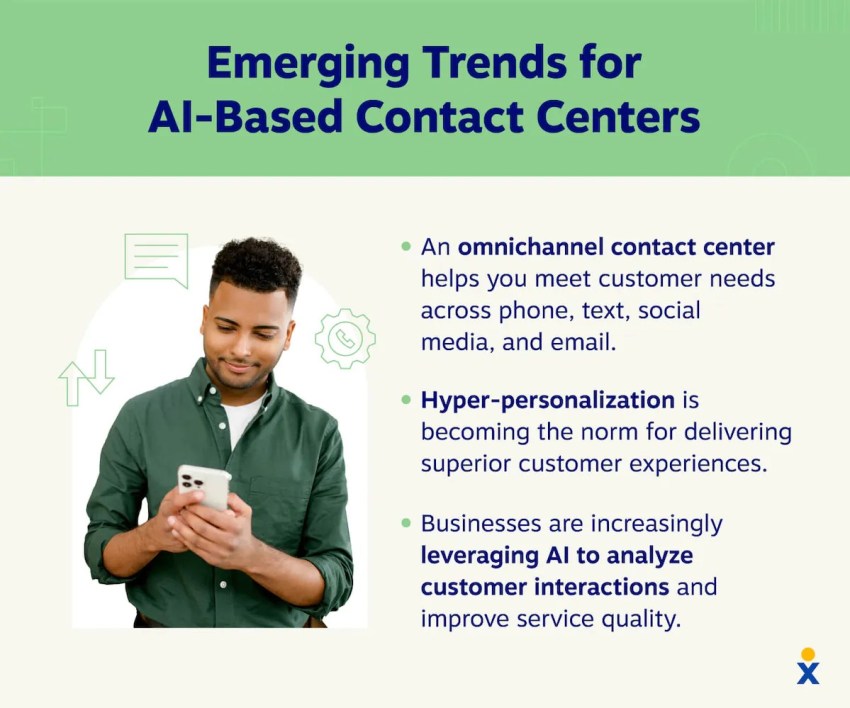
Omnichannel becomes even more important
As communication preferences change, traditional phone support is no longer the only choice for customers. Live chat is now the preferred channel, which 41% of customers favored.
However, phone calls still remain a popular support method, especially when dealing with complex customer inquiries. Having an omnichannel system in place is essential to meet evolving customer expectations. This includes integrating communication channels to provide a seamless experience across all touchpoints. With AI, maintaining consistency and streamlining communication becomes more manageable.
Hyper-personalization becomes the CX norm
As businesses strive to deliver better customer experiences, hyper-personalization is emerging as the new standard. By leveraging AI, companies can tailor interactions to individual preferences, customer behaviors, and past engagements.
This approach fosters deeper connections and drives brand loyalty, from personalized product recommendations to customized marketing messages. Embracing hyper-personalization allows companies to stand out in the competitive landscape by delivering memorable experiences that resonate with customers on a personal level.
Customer support benefits from AI-driven quality assurance
AI-driven quality assurance is changing the game in customer support. With AI analyzing customer interactions, it spots patterns and trends, helping businesses improve service quality.
Plus, AI can give instant feedback, helping improve agent performance so they can provide top-notch service every time. It also helps call centers stay on top of regulations, catching potential issues early. By using AI, businesses can:
- Make their customer support smoother
- Keep customers happy
- Work more efficiently
Answer More Calls with Nextiva
Consider implementing AI-based call center solutions to boost your team and enhance customer experiences. Start by adding features like website chat to engage customers instantly. If you feel swamped with inquiries, deploy chatbots to handle basic queries, freeing up your team for more complex interactions. With AI platforms handling routine tasks, your team of live agents can focus on delivering personalized support.
Nextiva’s AI-based tools, including our advanced interactive voice response (IVR) system, offer unparalleled efficiency for phone systems. They automate tasks and facilitate seamless support across channels, allowing your team to assist customers without interruptions.

Scale up with contact center AI.
The modern contact center has arrived. See how Nextiva helps you deliver the best customer experience at scale.
AI-Based Call Center FAQs
Discover more about AI-based call centers with the answers to these frequently asked questions below.
An AI-based call center enhances the customer experience by providing faster and more personalized service. AI analyzes customer data, including purchase history, sentiment, and prior interactions, to tailor conversations in real-time. It empowers agents with contextual insights, enabling them to communicate more effectively and relevantly.
Additionally, virtual agents provide 24/7 support, ensuring customers receive timely responses even outside business hours. In fact, 76% of customers expect personalized interactions from contact centers, and AI plays a pivotal role in meeting this demand through real-time personalization and predictive assistance.
AI enhances operational efficiency by automating routine tasks like call routing, customer verification, and ticket categorization. This reduces wait times, lowers agent workload, and accelerates issue resolution. During peak periods, enterprise-grade AI can absorb high call volumes, ensuring consistent service levels without requiring additional staff.
AI can handle up to 80% of routine customer inquiries, allowing human agents to focus on complex interactions that require empathy and critical thinking.
AI reduces costs in a contact center by minimizing the need for human intervention in repetitive tasks and improving first-call resolution rates. Intelligent virtual agents deflect calls, handle simple queries, and gather preliminary customer information before passing the case to a live agent. This streamlines workflows and shortens call times.
Businesses can reduce labor costs by up to 30% through automation while still maintaining high service quality.
AI-based call centers leverage several core technologies, including natural language processing (NLP), predictive analytics, sentiment analysis, and intelligent virtual agents. NLP allows for real-time transcription and analysis of calls, while predictive analytics helps anticipate customer needs based on historical data. Sentiment analysis identifies emotional cues, enabling timely intervention to resolve dissatisfaction.
According to Forrester, AI technologies combine to create seamless, data-driven customer journeys across voice, chat, and digital channels.
Predictions around CX and AI-based call centers include the rise of hyper-personalization, AI-driven quality assurance, and deeper integration with omnichannel platforms. AI is expected to play a greater role in coaching agents in real time, identifying compliance risks, and adapting to evolving customer behavior.
As customer expectations grow, businesses that deploy AI for proactive service and personalization will gain a significant competitive edge.

















 Customer Experience
Customer Experience 









